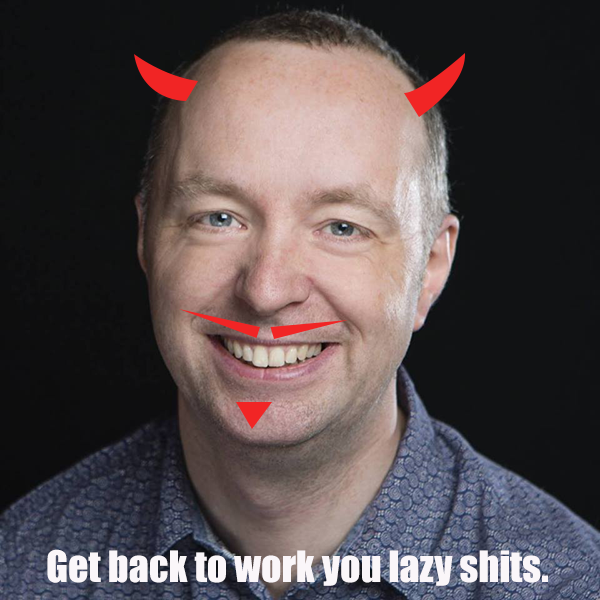If you follow Squeaky Wheels’ Facebook, Twitter, and Steam developer pages (and if you haven’t hint, hint please do so!) you’ll by know by now that we have just announced that we are publishing another studio’s game. As with many of Squeaky Wheel’s milestones, I wanted to take the time to dig into our thought process on why and how this happened.
But first, we’d like to introduce you guys to Maccima Games and their debut title Ruinarch (Wishlist PLEASE!).
Ruinarch is a wickedly fun evil overlord simulator where you cause havoc on people’s lives before taking their lands. Inspired by story generators like Rimworld and Dwarf Fortress, create an infernal narrative for your victims as you poison food, raise the dead, and inflict endless misery upon them.
If any of that spoke out to you, wishlist it now! Ruinarch is coming out in Early Access sometime in 2020.
How Did This Happen?
It’s really kind of crazy how Squeaky Wheel and Maccima Games hooked up. About half a year ago I randomly saw one of maccima’s tweets of a screenshot and thought “Hey, that looks cool! I clicked on the Twitter profile and saw that their website used the .ph (as in Philippines) domain. I checked out their website and we even more impressed with what I saw, and immediately chatted them up, asking about their game, and how I’d like to meet up some time to talk some more.
I came away from that meeting even more impressed, but we weren’t really in a position to make an offer at the time. It just felt good that there were other people making PC strategy games in Manila! I offered to help introduce them to people when they were ready to think about publishing, and only asked that they send us their pitch document as well to give us first dibs on a possible publishing deal
A few months pass, and Maccima came to us with a pitch. The pitch was professional, and most importantly realistic in terms of schedule and numbers. Maccima was a well run team that could operate independently of Squeaky Wheel, meaning we wouldn’t be wasting any time at all and effectively doubling our game development output.
After taking a hard look at what they needed and our financial state at the time, we decided that this was a financial risk that we could take. Even if the Ruinarch flops, Squeaky Wheel would still be able to stay afloat. So after about a month of negotations, we signed Maccima to a publishing deal in August, and we’re so excited to be finally able to share that now.
But why bother with publishing? Squeaky Wheel is still a tiny studio that doesn’t really have deep pockets. While we wouldn’t go under if Ruinarch flopped, that was still money that might otherwise have gone into our profit sharing pool. Tl:dr publishing Ruinarch is about more than just money to us. If you want to know more, just keep reading.
Nurturing an Industry
While I cannot speak for my other cofounders, part of what drove me to start a studio was a personal desire to help grow the Philippine game development industry. This fascination with building an industry all started with the time I read Richard Florida’s Flight of the Creative Class. In it, popular economist Richard Florida espoused a vision of the world where cities would compete for creative class workers (defined as people in science and engineering, architecture and design, education, arts, music and entertainment whose). Inspired by the book, I set about to do my own small part by helping to nurture the local game development industry.
At the time (about 10 years ago) I saw my role as community building. I helped to revitalize the local IGDA chapter, holding monthly meetings (against the wishes of some local studio managers) and creating a space where devs could meet and learn from each other. We started the first Manila Game Jam in 2010 to coincide with the global game jam, and I led the community for 3 years. It was often a struggle, but I firmly believed that if we had a strong community, the clustering effect would help propel individuals and companies to be at par with the world, and create a game industry that would funnel investment and money into the Philippine economy.
I’m proud of what we did, but I’m a little less naive now. I don’t think that the game industry on its own can lift up any country’s economy out of the mire. I don’t think there is any way to leapfrog our way into being an industrialized country, which I strongly believe is a prerequisite for any country or city to have a strong and growing creative class.
Squeaky Wheel
As fulfilling as IGDA was, three years had taken its toll on me, so I took a break to focus on myself and my freelance career first. This culminated in my work on Prison Architect. While it was immensely gratifying to be a part of a game that truly shaped the industry (so much so that Paradox Interactive bought the IP!), I felt that PA was as far as I could go as an individual. That, combined with the ever nagging impulse to nurture the local industry, was one of the things that led to the formation of Squeaky Wheel (if you are interested, read about the long road to the creation of Squeaky Wheel and how we landed our first publishing deal this three part blog series: Part 1, Part 2, Part 3).
Running Squeaky wheel has been quite the experience (read restrospectives from 2016, 2017, 2018). We launched a game that flopped. We launched a game that succeeded. We’re nowhere near as successful as many other companies, but we are in the extremely fortunate position of being able to survive and support ourselves. Now that we are in that position where we’re no longer on the verge of collapsing every month, why choose to spend that money on other people rather than ourselves?
Why is Publishing Important To Us?
Publishing a game means so much more to the local industry than simply handing over a bunch of money to another developer. All of the funding that Squeaky Wheel has had so far came from outside the Philippines. That may not seem like a big deal to developers from other countries stacked with publishers but let me tell you : it feels fucking good not to have to rely on outside funding. What makes this more special for me is that game development is one of the few industries in the Philippines where you can create almost literally create something out of nothing. A decade ago, most local funding came from foreigners, oligarchs, and deeply entrenched business interests. I am immensely proud that bunch of weirdo gamedevs from varying lower to upper middle class backgrounds came together to create a studio that can now support other studios. It is a sign of the maturity of our industry. It says “we can do this on our own now”. Being able to say that, and being able to support another studio’s creative endeavor, is worth so much more than the money we put into their studio.
Where Do We Send our Pitch?
So are we really a “publisher” now? Well, not really. There was a huge confluence of circumstances that led to this point. We’re not actively looking to publish any more games than this (especially since we don’t really have the budget!) but who knows what the future might bring?
Thanks for reading, and hope you found this interesting! If you want to support us, you can buy Academia: School Simulator or Political Animals, or wishlist Ruinarch.

















